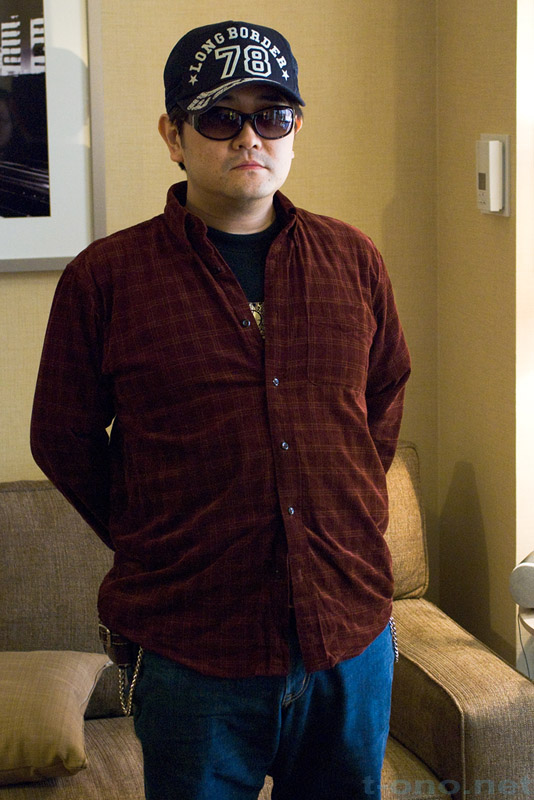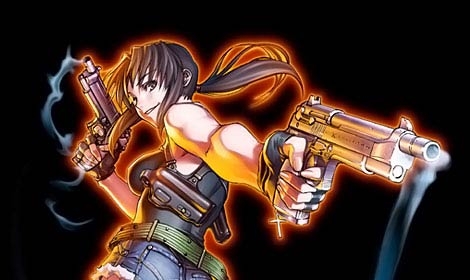Rei Hiroe is the creator and author of the popular manga series, Black Lagoon. The manga has received an anime adaptation, with a third season that debuted in North America at Anime Expo 2010. Hiroe himself was at Anime Expo to celebrate the screening, and we got a brief chance to talk to him a little bit about his work.
T-ONO: Have you been to the United States before?
Hiroe: I’ve been to Hawaii for family vacation type things, but I’ve never been to the mainland.
T-ONO: Are there any particular places you would like to visit while you’re here?
Hiroe: There’s a few of them but nothing in particular in Los Angeles, but within the U.S. there’s a couple different places I would like to see.
T-ONO: The amount of information that goes into Black Lagoon, the realism and the amount of detail, for example guns characters and organizations, are very realistic. Did you research these things specifically or do these come from your own accumulated knowledge?
Hiroe: It’s a little bit of both. A lot of the times I’ll be researching, and then I’ll find some interesting facts that I would like to incorporate into my works, so that leads to more reasons to making the Black Lagoon manga. At the same time I try not to go towards current events, but I try to use past information for the entertainment value.
T-ONO: So most of it is just for entertainment value. You're not trying to bring to light some of the darker material?
Hiroe: Essentially, yes.
T-ONO: In Black Lagoon, Roberta has been starred in probably one of the longest segments of the series. Do you have a particular attachment to the character?
Hiroe: She was there since the very beginning as one of my original characters, and she was able to luckily survive through the series and appear again. At the very beginning she had a very set character background, but I wanted to see if I could go past that and break it down and see what I could do with it, which is why I brought her back up.
T-ONO: The character Rock is your average typical Japanese businessman trying to get started in the world. Do you feel that an actual person would be able to survive in Rock’s situation?
Hiroe: Unless he’s very lucky, I think it would probably be quite difficult! (laughs)
T-ONO: In particular, there’s been a lot of live action adaptations of anime series here in America. If Black Lagoon was ever adapted into live action, would you like to see an American production? If so, any particular actors or directors?
 Hiroe: I guess I would. I think it’s an interesting idea to have a live action. I would want to make sure that I could talk with the production company and that they follow what I want, and not get something that’s totally different. For director, I don’t really have any preference as long as they understand what I’m trying to do with the whole manga. Since there is really no model for the characters, I really can’t see who might do it. I don’t really have a preference.
Hiroe: I guess I would. I think it’s an interesting idea to have a live action. I would want to make sure that I could talk with the production company and that they follow what I want, and not get something that’s totally different. For director, I don’t really have any preference as long as they understand what I’m trying to do with the whole manga. Since there is really no model for the characters, I really can’t see who might do it. I don’t really have a preference.
T-ONO: Moving on quickly to the art of Black Lagoon, now the designs are extremely detailed. Typically, how long does it take for the production of one chapter?
Hiroe: There are various lengths to each chapter on the series, but about a month for the most part. I say that because there are a lot of details and I put a lot of work into it, it does end up taking about a month which is quite long.
T-ONO: Especially working on a series like this with regard to some of the controversial content, have you been given a lot of freedom for what you make or has it been agreeable with your editor?
Hiroe: There is a process as to how I work. The initial thought, then once I have that done the publisher will give me input as to what’s good and what’s bad and what’s good for the audience, what they might like. We talk about it in discussions, and if it’s something that might not work so well we redo the plot line and we do a lot of editing. While there are a lot of manga artists out there who can’t seem to have a good relationship with the publishing company and they have to do what they want, in my case it’s more mutual. I can do more of what I like at the same time.
T-ONO: Has there been any particular instances where you strongly pushed for something which the editors rejected?
Hiroe: There have been things where what I want to do hasn’t gone through, but in such cases it’s as a result of long discussions where we both agree that maybe this time, we shouldn’t do this. It’s never just the editor going out of his way saying, “no you can’t do that.”
T-ONO: Lastly as a fun question, do you feel your portrayal of Revy has increased the sale of hot pants and cut-off jeans?
Hiroe: (laughs profusely) Well I haven’t heard anything at least!

